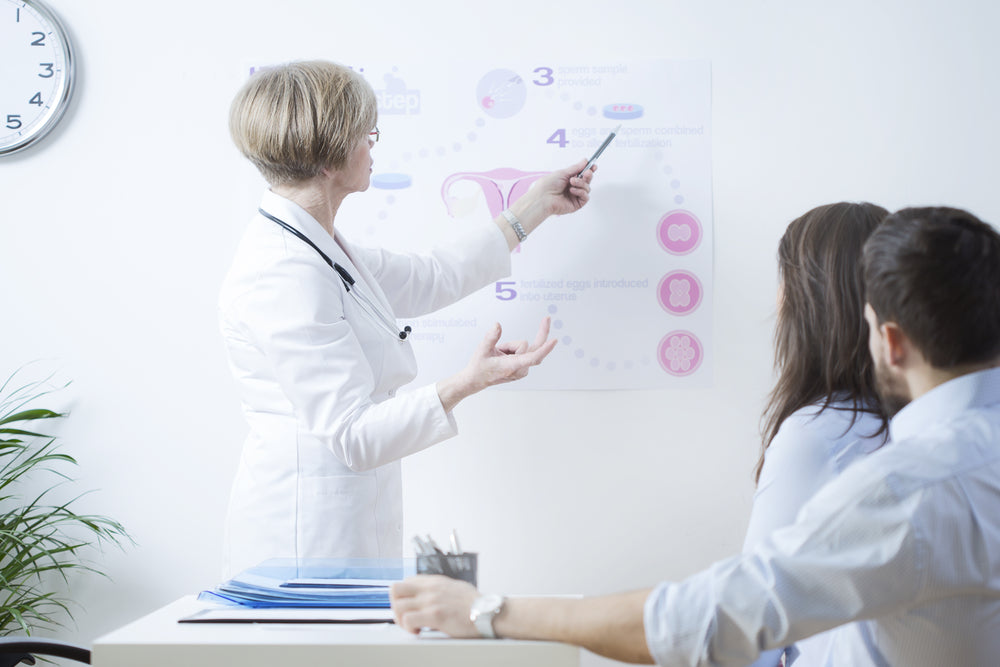
Quand consulter un spécialiste de la fertilité
Partagez
Quand consulter un spécialiste de la fertilité
Lorsqu'on fonde une famille, la plupart des gens espèrent concevoir naturellement et dans les délais souhaités. Cependant, lorsque la conception ne se déroule pas comme prévu, la question de savoir quand consulter un spécialiste de la fertilité devient un sujet de conversation pour de nombreux couples.
En général, si vous essayez de concevoir depuis plus d'un an ou si vous souffrez de certains problèmes de santé, il est probablement judicieux de consulter un médecin spécialement formé au traitement des problèmes de fertilité. Ne vous inquiétez pas trop, cependant. Non seulement l'infertilité est un problème courant rencontré par près de 15 % des couples, mais il existe de nombreuses méthodes naturelles et non médicales pour augmenter les chances de tomber enceinte. Ci-dessous, nous examinerons de plus près les signes qui pourraient vous amener à contacter un spécialiste de la fertilité , nous expliquerons à quoi vous attendre lors de votre rendez-vous et nous vous proposerons des remèdes naturels qui pourraient vous aider à concevoir sans avoir recours à des traitements de procréation assistée.
Qu'est-ce qu'un spécialiste de la fertilité
En bref, un spécialiste de la fertilité est un gynécologue-obstétricien, un urologue ou un endocrinologue de la reproduction spécialisé dans les organes reproducteurs et les problèmes de fertilité. Le spécialiste effectuera une variété de tests, en commençant par des analyses sanguines et un examen physique, une analyse du sperme pour les hommes et un examen pelvien et/ou une imagerie pour les femmes.
Une fois le diagnostic établi, le spécialiste de la fertilité travaillera avec vous pour élaborer un plan de traitement, qui peut inclure tout, depuis la modification des facteurs de style de vie jusqu'à la fécondation in vitro (FIV).
Pourquoi consulter un spécialiste de la fertilité
La plupart des médecins recommandent de consulter un spécialiste de la fertilité si vous essayez de concevoir sans succès depuis au moins un an ou si vous avez plus de 35 ans et que vous essayez de concevoir depuis au moins six mois. Et si vous avez plus de 40 ans, il est recommandé de demander l'aide d'un spécialiste dès le début.
D’autres raisons de consulter un spécialiste de la fertilité incluent :
- Chirurgie pelvienne ou infection antérieure
- Cycles menstruels irréguliers ou douloureux
- Difficulté à maintenir une érection
- Endométriose
- Trois fausses couches ou plus
- Histoire des infections sexuellement transmissibles
- Discuter si la FIV est une bonne solution pour vous
Aides naturelles à la fertilité
Suivi du cycle d'ovulation et planification des rapports sexuels – La plupart des femmes ont un cycle d'ovulation de 28 jours, avec une fenêtre de six ou sept jours au milieu du cycle pendant laquelle un ovule a été libéré et peut être fécondé. À l'aide d'un kit de prédiction de l'ovulation, qui mesure le pic hormonal d'une femme associé à la libération de l'ovule, les couples peuvent planifier leurs rapports sexuels en fonction de cette fenêtre de fertilité.
Alimentation et exercice physique – Deux facteurs peuvent rendre la grossesse plus difficile : une alimentation malsaine et un mode de vie sédentaire. En ce qui concerne le premier, la consommation d’aliments riches en antioxydants s’est avérée bénéfique pour améliorer les taux de fertilité, en particulier chez les hommes. Éliminer les glucides, les sucres et les gras trans contribue à une perte de poids saine et à une meilleure chance de concevoir.
Rester actif est également bénéfique. L'exercice modéré est particulièrement bénéfique : les entraînements à haute intensité peuvent en réalité nuire à la fertilité d'une femme. Et l'exercice n'est pas seulement excellent pour perdre du poids, c'est aussi une excellente source de soulagement du stress.
Compléments alimentaires naturels – Certaines personnes ont du mal à obtenir tous les minéraux, nutriments et antioxydants dont leur corps a besoin pour un système reproducteur sain dans leur alimentation quotidienne. Dans ces cas, les compléments alimentaires naturels peuvent être un moyen simple et efficace de compléter votre alimentation et de combler vos éventuelles carences nutritionnelles.
Les bienfaits des compléments naturels pour la fertilité
Des études prometteuses ont été menées sur le rôle des vitamines dans la grossesse. Un apport adéquat en vitamines et minéraux, associé à une alimentation équilibrée et à un mode de vie actif, a été associé à l'amélioration de nombreuses fonctions essentielles du système reproducteur de la femme, contribuant ainsi à créer un environnement plus propice à une grossesse saine. Certaines études ont même montré que certains nutriments peuvent réduire les symptômes du syndrome des ovaires polykystiques (SOPK), l'une des principales causes d'infertilité.
Un supplément vitaminique comme FERTIL PRO Women est un excellent exemple de multivitamine complète qui peut améliorer le bien-être reproductif pendant la période de préconception.
Les ingrédients et les avantages potentiels comprennent :
- Vitamine A – favorise l’implantation, la formation du placenta et le développement des ovules
- Vitamines B6, B9 et B12 – réduisent le risque d’anémie et de prééclampsie
- Vitamine D3 – des niveaux suffisants de vitamine D3 aident à protéger contre les complications, notamment le faible poids à la naissance
- Le reishi, un champignon médicinal riche en antioxydants qui peut être utile aux femmes souffrant de troubles immunitaires
- Le magnésium, essentiel au bon fonctionnement des nerfs et des muscles
- Le fer contribue à la production de globules rouges essentiels, en particulier au cours du 3e trimestre
- Zinc et cuivre – les propriétés antioxydantes peuvent stimuler le système immunitaire
Il est important de se rappeler que les problèmes de fertilité sont un problème courant auquel de nombreux couples sont confrontés et que diverses options de traitement sont disponibles. Si vous souhaitez découvrir d'autres compléments naturels qui peuvent vous être utiles lorsque vous avez du mal à tomber enceinte, consultez la gamme de compléments nutritionnels de Yad-Tech, basés sur la science et recommandés par des spécialistes de la fertilité .
